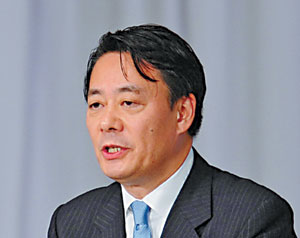
PM has alienated key allies, made 'authoritarian tendencies clear'
Japan's main opposition leader chided Prime Minister Shinzo Abe on Tuesday for conservative statements on wartime history and voiced fears he could be a "destabilizing" factor in East Asia.

On a visit to Washington, Banri Kaieda, president of the opposition Democratic Party of Japan, said on Tuesday that he remained fully committed to the country's past expressions of regret for its wartime behavior.
Kaieda said that Abe government's remarks and actions had alienated Japan's neighbors as well as its US and European allies by "fueling suspicions that Prime Minister Abe may be a historical revisionist".
"I clearly reject historical revisionism and will oppose it," Kaieda said at the Brookings Institution think tank, vowing that his party "will safeguard the mature democracy fostered by post-war Japanese society".
"Domestically, the Abe administration has now made its authoritarian tendencies clear, and internationally, the Abe administration could move beyond the realm of healthy nationalism and become a destabilizing factor in East Asia," Kaieda said.
In December, Abe visited the Yasukuni Shrine, which honors 2.5 million Japanese war dead, including 14 convicted war criminals from World War II. The move outraged China and South Korea and led to a rare public rebuke by the United States, Japan's main ally.
Abe - whose grandfather was arrested, but not prosecuted as a war criminal - is known for his conservative views. While in opposition, he questioned whether imperial Japan forced women into sexual slavery, although he has since indicated he will not revoke a landmark 1993 apology to the "comfort women".
Copyright ©1999-2018
Chinanews.com. All rights reserved.
Reproduction in whole or in part without permission is prohibited.